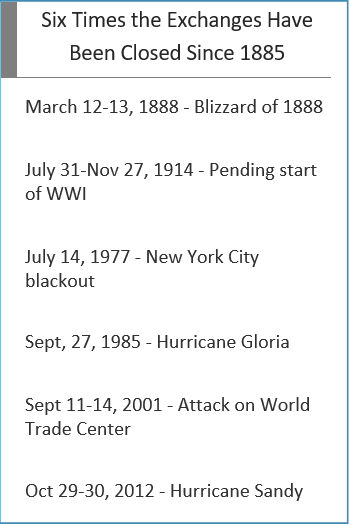
|

|

|

|

Sorry We’re Open – Pros & Cons of Closing Equity Markets
Any Face-to-face discussion has been rare for me the past couple of weeks. But, my conversations with many people that have passed through my life, is at an all-time high. Last Sunday I received a Facebook message, with an attached article, from an intern who had worked for me years back. Advay was a sharp kid when I met him, he had a healthy sense of humor and an amazing capacity for statistics. His grasp of numbers always came in handy when we’d discuss baseball, less helpful when I’d assign him a project. Over time, he’s done quite well for himself as a mutual fund manager.
The last time I heard from Advay was when his son was born, that was four years ago, so we haven’t been in touch. The article he forwarded to me was from Bloomberg. It mildly suggested that the stock markets should be closed until the economy gets its grip. His own message, along with the article read, “This needs to happen now!”
I hadn’t given much thought to the markets closing for the pandemic. At my core, I’m a free-market believer that trusts there is a danger when markets of any kind are manipulated or the rules are otherwise changed. In my mind, to restrict trading would cause less certainty and more panic selling. I know I’m not alone in my thinking. Some expect that even the whisper that a market closure might happen could spark a total route. On Oct. 19, 1987—the day of the “Black Monday” market crash, the SEC chairman, David Ruder told reporters that trading might be halted. He never did follow through and pull the plug on trading, but having mentioned it, probably caused deeper panic selling. He regretted even suggesting it. Ruder, years later said that closing markets is a mistake, “You could actually be causing more chaos by trying to close the U.S. markets down,” Ruder said.
Some Argue That Open Is Best
Before responding to my old intern’s IM on Facebook, I decided I’d learn a little more about the current discussion on the topic. I found, on the side of the debate to keep the markets open are key decision-makers like Treasury Secretary Mnuchin who said, “We think it is in the best interest to keep the markets open,” He said this at a meeting of the Financial Stability Oversight Council, which includes the heads of the Treasury, Federal Reserve, and the Securities and Exchange Commission. The Trump Administration is even more resolute. They have continually vowed to keep the stock market open. Terrence Duffy, chairman and chief executive officer the CME Group Inc., told The Wall Street Journal in an interview. “I think it’s a horrible idea. You could actually be causing more chaos by trying to close the U.S. markets down.” The Nasdaq head of North American Markets, Tal Cohen has said, “The markets are functioning well,” he added, “The direction of stock prices is another question.” Representatives from the New York Stock Exchange, have also said they are committed to keeping their exchanges open.
Some Argue That Closed Is Best
Among those that think it best if the exchanges close to let the market catch its breath during the pandemic are Senator Manchin of W. VA who told MSNBC “Maybe close a day or two…Calm the waters if you will.”
Some in the financial industry agree. Although not a majority, Executives from some of the world’s largest asset managers told the Bank of England’s governor in a call earlier this month that they believe the markets should close for two weeks.
Closing the stock market has been done before. In 1888 it closed for two days for a blizzard, in 1914, the NYSE closed for about four months when World War I broke out, stock exchanges also closed for more than a week in March 1933 when President Franklin D. Roosevelt declared a bank holiday to stop financial panic, again in 1985 after hurricane Gloria, then in 2001 after the World Trade Center attack, and then for two days in 2012 after hurricane Sandy.
These are Emotional Times
I decided to respond to Advay by first understanding that he personally may be down quite a bit in the market. This could impact one’s thinking (and one’s mood). I also kept away from politics or my laissez-faire philosophies related to this wealth depleting (hopefully temporary) selloff. Lastly, I decided to call him rather than write. I wanted him to know from the tone of my voice that I was not against him personally, but instead may differ in my thoughts on the merits of closing equity markets.
I also dug a bit into my own thinking, then called him. I asked about his son and his wife and the delay of the baseball season. Then after a brief polite conversation, I explained that companies need access to capital and individuals need access to their investments. Neither can do this well with the markets closed. To limit either would further worsen the challenges both people and corporations are feeling. It isn’t about greed at all, it’s about having more options.
Paul Hoffman
Managing Editor
Suggested Reading:
Where Investors Found Double-Digit
Growth in Q1
Unemployment, how high can it go
Is there a gold lining among the
clouds?
Sources:
Close the
Markets? Data and Psychology Say Maybe
Venues
may close. Trading should remain open
Authorities are being pressured to close markets
Some Top Asset
Managers Argue Financial Markets Should Close
